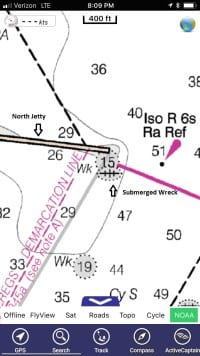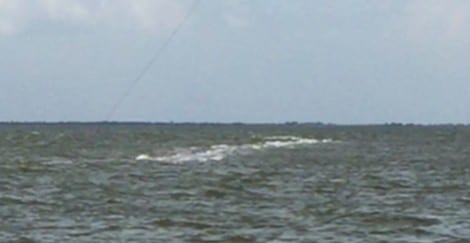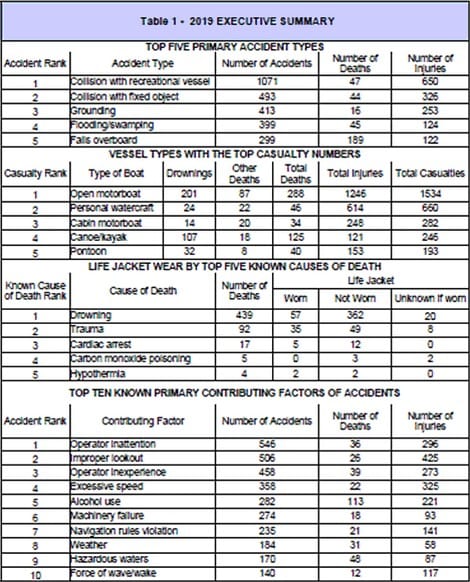 By Bob Currie, Recreational Boating Safety Specialist
By Bob Currie, Recreational Boating Safety Specialist
U. S. Coast Guard Auxiliary Station Galveston Flotilla
Sometimes when bad things happen our actions or lack thereof make them worse. For this column I have taken a page from the 2019 Recreational Boating Statistics (literally- see below) to identify the top five primary accident types and address them. Take a few minutes to scroll down to the table and review it. Knowledge of what can go wrong is part of the process of staying safe. The second part of the process is knowing what to do or not to do if you find yourself in a particular situation. There are many different causes of recreational boating accidents, but we will just discuss the top five causes, as they seem to be the same reasons year after year. Their order may change, but they are still in the top five list. The Contributing Factors table is a good place to start in order to keep your chances of staying safe high.
The Station Galveston Flotilla of the US Coast Guard Auxiliary operates out of the USCG Station Galveston base on Galveston Island. They aid the Coast Guard by providing maritime observation patrols in Galveston Bay; by providing recreational boating vessel safety checks; and by working alongside Coast Guard members in maritime accident investigation, small boat training, providing a safety zone, Aids to Navigation verification, in the galley, and on the Coast Guard Drone Team.
Contributing Factors
Contributing factors are the reasons why recreational boating accidents happen. If you eliminate the contributing factors, you remove the most common causes of the accidents we will discuss. The top ten primary contributing factors of accidents are:
- Operator inattention: Hey! Look where you are going! You wanna kill somebody!? Yes, I have yelled that at someone more than once. It’s the number one contributing factor in recreational boating accidents.
- Improper lookout: A lookout is the only position on a boat that is required by law. I have watched boats get t-boned because they made a sweeping turn right into the path of a boat that was legally passing them. A lookout to the rear can prevent such accidents.
- Operator inexperience: You may have been driving boats for forty years, but if you have never been in a particular waterway and haven’t taken the time to research it for hazards, your inexperience in that waterway could get you in trouble. That said, most accidents with operator inexperience as a primary contributing factor involve new boat owners. Remember: if you were born after August 31, 1993, you must have taken a boater safety course to operate most boats.
- Excessive speed: If you were moving and you hit someone due to your own mistake, you more than likely had excessive speed as a contributing factor. You were going too fast for the situation.
- Alcohol use: Alcohol and water never mix. Even one beer in hot weather can lead to unsafe boating. Although alcohol used to be the number one contributing factor, it has moved down the list; just not far enough. You are three times more likely to have a fatal accident when alcohol is involved than with any of the other top ten contributing factors.
- Machinery failure: Oh, there are so many things that can go wrong with your equipment. This statistic is the best reason to undergo a Coast Guard Vessel Safety Check (VSC). VSCs are free, and the examiner will come to you. Equipment failures include sound device failure; fuel system failure, electrical system failure, and exhaust system failure leading to fire; throttle failure, and steering system failure.
- Navigation rules violation: You zigged when you should have zagged. You can easily access the navigation rules, also know as the Rules of the Road from the Coast Guard app for your smart phone. No one should operate a boat without knowing these rules.
- Weather: Remember the SS Minnow? The weather started getting rough, the tiny ship was tossed … You have got to check the weather before sailing and have the sense to return to port when it changes for the worse.
- Hazardous waters: If still waters run deep, does that mean that choppy waters run shallow? In some cases the answer is yes. You have got to know where the shoals are located and avoid them. You have to know where strong currents create eddies that can spin your boat into the rocks or breakwater.
- Force of wave/wake: Boat operators are responsible for damages caused by their wakes. If your boat is not capable of handling heavy seas or you don’t know how to operate in heavy seas, then head for port when you encounter them.
Collision with Recreational Vessel
Collisions with recreational vessels will always be at the top of the list of accident types. As big as the wide blue sea is, we always seem to run into each other, and not in a good way at that. Why is it that people understand that in the USA we drive on the right, but don’t understand that the same rule applies on the water? Collisions with another vessel are always due to a failure to follow the navigation rules. Most of the time we can also add excessive speed (slow down when approaching another boat until it is obvious what path they will take); operator inattention and improper lookout are often contributing factors when one boat is overtaking another.

Grab Shot from my Backup GPS
You don’t have a rear view mirror? That’s why you are supposed to appoint a lookout for boats overtaking. Operator inexperience and alcohol use also figure prominently in collisions.
Collision with Fixed Object
I am not even going to mention collisions with free floating objects (oh, I did- sorry). Do you have a chart of the area in which you intend to operate your boat? By chart I mean one issued by NOAA, a fishing map based on a NOAA chart or the chart on your GPS. Look at it closely. You will see notations such as “Submerged Pipe,” Submerged Pile,” and several symbols such as the one that is shaped like a football with its stitching on top that means “Submerged Wreck.” There are so many fixed objects out there that no prudent boater would operate in our waters without a recently printed chart of updated GPS. Contributing factors for this type of accident include operator inattention, improper lookout, operator inexperience, excessive speed, and hazardous waters. Operating at night adds a whole new dynamic to boating. If you can’t safely stop before hitting an object in the water that just appeared in your vision, you are going too fast.
Grounding
Our bays are kind of like a swimming pool- the deep end is out in the middle and the shallow end is close to the ladder (ramp, shore). We also have reefs and shoals that at least part of the time are either just above the water line or just below the water line. You have got to know where those reefs and shoals are and recognize them when you see them. If you look at the picture I took of a shoal out in the middle of Galveston East Bay, you will see the cause of many a boat grounding. If you hit that at 30 mph you can be assured of (1) grounding your boat, (2) tearing up the bottom of your boat, and (3) tossing all persons aboard into the water with the possibility that not all of you will be going home alive. Contributing factors for this accident type include operator inattention, improper lookout, operator inexperience, alcohol use, and hazardous waters. How about weather? Yes, considering the weather includes tides. The pattern on the water seen here was at low tide. At high tide the white water pattern may not be there, but the wave pattern would still look different from the surrounding water and you might still ground on the shoal.

Shoal- picture by author
Flooding/Swamping
What we have here is water filling the boat to the point that it sinks or rolls over. There are several causes for this to happen; one way is when the boat pitches into a wave when running in heavy seas. Another is when a boat moving at speed is stopped suddenly by rapidly shutting off on the throttle, causing the wake to roll over the transom. Both occurrences are more likely to happen when the boat is overloaded. If you are running in heavy seas you must learn to time the wave periods so the boat doesn’t porpoise beneath a wave and take on water. Here the contributing causes are operator inattention, operator inexperience, excessive speed, alcohol use, weather, hazardous waters, and force of wake/wave. This is one we can’t blame on the lookout unless there was a tidal wave headed for the boat that wasn’t seen because the lookout wasn’t looking out. Flooding or swamping could be the result of machinery failure; the steering could fail or the throttle hang up. You can’t dismiss those possibilities. That is why it is so important to perform routine maintenance and to regularly inspect your equipment.
Falls Overboard
Although it is at the bottom of the top five primary accident types, falls overboard accidents are the deadliest. Fully 65% of all accident deaths were due to the person drowning, and in 82% of those cases the victim was not wearing a life jacket. All ten of the contributing factors are implicated in the injuries and deaths attributed to falls overboard. A navigation rules violation has been known to cause the boat operator to take sudden and unexpected course changes to avoid collision that resulted in the ejection of passengers. Many people who drowned when they fell overboard could have been saved had they only been wearing a life jacket.

Summary
By knowing the top five causes of recreational boating accidents and the top ten factors that contributed to them, the marginal boater can use this knowledge to change bad habits to good habits and thus become a much safer boater. Everyone has the right to come home safely; it is up to the boat operator to make that happen.
For more information on boating safety, please visit the Official Website of the U.S. Coast Guard’s Boating Safety Division at www.uscgboating.org. Questions about the US Coast Guard Auxiliary or our free Vessel Safety Check program may be directed to me at [email protected]. SAFE BOATING!
[Oct-26-2020]

 Posted in
Posted in 























